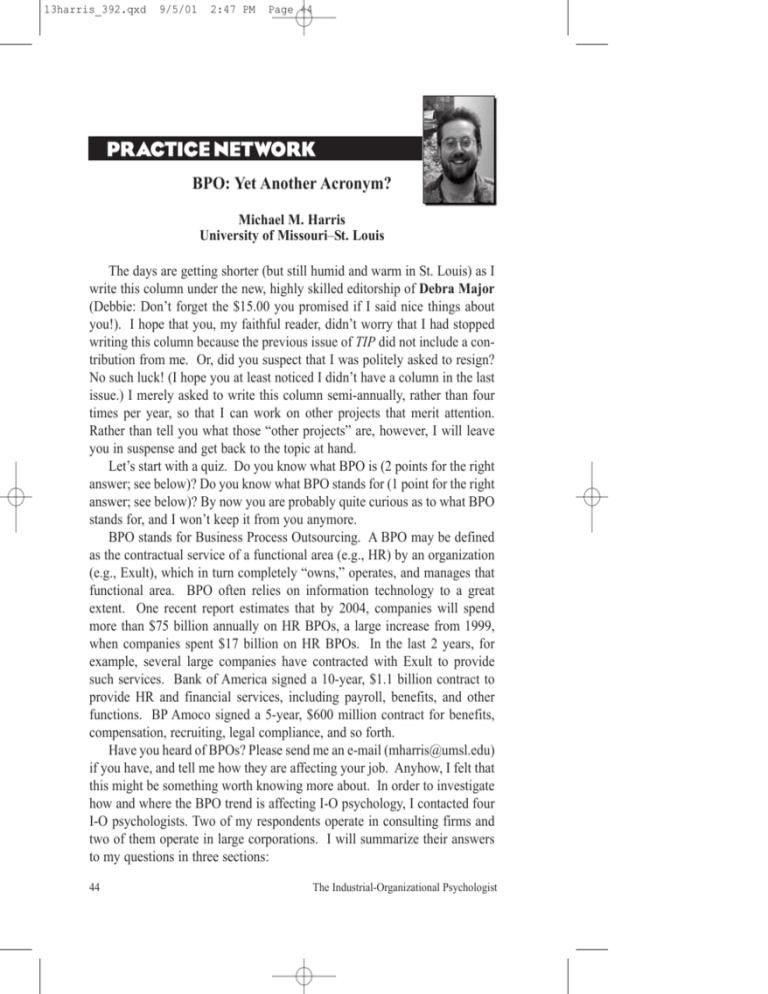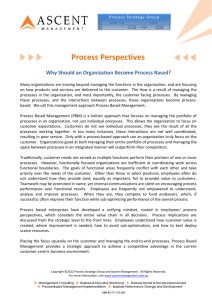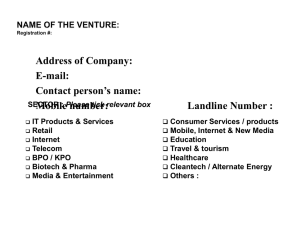BPO: Yet Another Acronym? - Society for Industrial and
advertisement

13harris_392.qxd 9/5/01 2:47 PM Page 44 BPO: Yet Another Acronym? Michael M. Harris University of Missouri–St. Louis The days are getting shorter (but still humid and warm in St. Louis) as I write this column under the new, highly skilled editorship of Debra Major (Debbie: Don’t forget the $15.00 you promised if I said nice things about you!). I hope that you, my faithful reader, didn’t worry that I had stopped writing this column because the previous issue of TIP did not include a contribution from me. Or, did you suspect that I was politely asked to resign? No such luck! (I hope you at least noticed I didn’t have a column in the last issue.) I merely asked to write this column semi-annually, rather than four times per year, so that I can work on other projects that merit attention. Rather than tell you what those “other projects” are, however, I will leave you in suspense and get back to the topic at hand. Let’s start with a quiz. Do you know what BPO is (2 points for the right answer; see below)? Do you know what BPO stands for (1 point for the right answer; see below)? By now you are probably quite curious as to what BPO stands for, and I won’t keep it from you anymore. BPO stands for Business Process Outsourcing. A BPO may be defined as the contractual service of a functional area (e.g., HR) by an organization (e.g., Exult), which in turn completely “owns,” operates, and manages that functional area. BPO often relies on information technology to a great extent. One recent report estimates that by 2004, companies will spend more than $75 billion annually on HR BPOs, a large increase from 1999, when companies spent $17 billion on HR BPOs. In the last 2 years, for example, several large companies have contracted with Exult to provide such services. Bank of America signed a 10-year, $1.1 billion contract to provide HR and financial services, including payroll, benefits, and other functions. BP Amoco signed a 5-year, $600 million contract for benefits, compensation, recruiting, legal compliance, and so forth. Have you heard of BPOs? Please send me an e-mail (mharris@umsl.edu) if you have, and tell me how they are affecting your job. Anyhow, I felt that this might be something worth knowing more about. In order to investigate how and where the BPO trend is affecting I-O psychology, I contacted four I-O psychologists. Two of my respondents operate in consulting firms and two of them operate in large corporations. I will summarize their answers to my questions in three sections: 44 The Industrial-Organizational Psychologist 13harris_392.qxd 9/5/01 2:47 PM Page 45 1. The effects of BPO on our field; 2. The effects of BPO on our skill sets; and 3. The future of I-O psychology as a result of BPO. What Are the Effects of BPO on I-O Psychology? BPO will have a variety of effects on our field, some potentially good and some potentially bad. Or, to borrow some terms from strategic management, BPO provides both threats and opportunities to I-O psychology. On the opportunity side, one respondent observed that if I-O psychologists control the HRM business process, it will be much easier to do things such as validation studies. Also, if an I-O psychology firm obtains the BPO contract, there is an opportunity for I-O psychology principles and practices to be used to a far greater extent than has heretofore been the case. Imagine, for instance, a firm with I-O psychologists who contract with the organization to assume the staffing side of HRM. The BPO firm might recruit, select, provide an realistic job preview, offer new employee orientation, and conduct training programs. Imagine that opportunity to apply our I-O psychology know-how. On the negative side, one of my participants noted that in-house I-O psychologists could potentially lose their jobs if the HRM department is outsourced. This was perceived to be particularly true given that I-O psychologists are often viewed as expensive specialists. By way of analogy, think about HMOs and why they often require one to see a primary care physician, who acts as a gatekeeper, first. If you want to cut costs, one strategy is that you go to the generalist first, and only use a specialist when you must! Of course, for those of you who have had to fight to see the specialist, you probably have first-hand knowledge of the expression, “A jack of all trades and a master of none.” If that isn’t reason enough, one respondent noted that companies often downsize by mere “head count” and given that I-O psychologists are usually viewed as “staff,” they are moving targets for replacement by a BPO. I would say that this view is probably the most pessimistic perspective. Nonetheless, it probably has already occurred to you that even the outsource companies will need I-O psychologists—or will they? On the positive side, I checked the Web site of exult.com and found that the advisory council includes Ed Lawler. So there may be some involvement by IO psychologists. On the other hand, having spent quite a bit of time looking through names in the SIOP directory, I can’t recall seeing anyone listed with employment at Exult or another BPO organization. (If you are employed by such an organization, and you are an I-O psychologist, please contact me!) Yet, some I-O firms, such as DDI, are offering outsourcing for at least some HR functions. Perhaps down the road, some I-O firms will offer to completely operate an organization’s HR function. The Industrial-Organizational Psychologist 45 13harris_392.qxd 9/5/01 2:47 PM Page 46 How Will BPO Affect I-O Psychologists’ Skill Sets? It won’t surprise you that BPO trends are likely to broaden our necessary skill sets. As one of my respondents pointed out, the decision by an organization to outsource a business process has nothing to do with I-O psychology. In order to understand whether or not an organization should outsource the HRM department, it would be important to understand the factors that go into these decisions. The problem, however, is that I-O psychologists are not really trained in the factors that might affect this decision. As one respondent observed, I-O psychologists have not been particularly cognizant of considerations such as cycle time, cost, durability, and other system design features. Thus, we need to become more familiar with how to design and build effective processes. A second way in which BPO will affect our skill sets is in the importance of strategic thinking. While I-O psychologists focus more on the managerial (e.g., designing a validation study) and the operational side (e.g., administering an assessment center), the BPO model focuses on making strategic decisions. A good example of a strategic decision would be deciding whether to outsource the HRM department or to keep it in-house! Would you believe there is even research on this topic (e.g., Klass, McClendon, & Gainey, 2001)? Respondents also pointed out the importance of breadth in addressing BPOs. It was argued that we need to know much more about a broad range of topics, including health and safety, teams, OD, and so forth. We tend to be narrow specialists; this trend would suggest that at least for some roles (e.g., in-house I-O psychologist) we need to become broader. Finally, a respondent suggested additional skills needed for an in-house I-O psychologist who deals with BPOs, such as project management competencies, contract negotiation abilities, vendor management, database management, and knowledge of HTML. Before you despair completely, though, I would like to point out that no one argued that I-O psychology knowledge and skills would become obsolete. As one respondent pointed out, he used to spend his time creating I-O tools. Now he spends his time making sure that the vendors are correctly delivering their products and following company procedures. It was clear that while the nature of his job has changed in some sense (i.e., no longer creating the tests, but monitoring to ensure that they were properly created) and the competencies expanded, an I-O psychology background is still needed. Is There a Future for I-O Psychology After BPO? Either I had done a poor job in my e-mails and telephone calls, or my respondents dodged the question, so I had little direct information as to the impact of BPOs on our field. Nevertheless, I will try to address it, based on what I gleaned from my respondents, as well as what I have read about elsewhere. 46 The Industrial-Organizational Psychologist 13harris_392.qxd 9/5/01 2:47 PM Page 47 So, I am going to “stick my neck out” and argue that the BPO trend has the potential to significantly change the way in-house I-O psychologists function, though I expect it will have less influence on the way external consultants will operate. As a proof, last week when I was in the airport, I met a friend of mine who works for a large I-O consulting firm. After exchanging pleasantries, we began discussing why we were both in the airport. My friend revealed that he was going to present a proposal to an organization to sell the consulting firm’s tests for a selection project. I asked him who he thought their biggest competitor would be for this project and to my great surprise, he answered with the name of a staffing firm that would supply the actual candidates, rather than just provide a test battery. Would anyone have answered that way 5 years ago? I don’t believe so. I think that BPO will alter the way we function as I-O psychologists, particularly for in-house positions, though there will always be a need for I-O skills as part of a BPO. Moreover, I suspect that 10 years from now, few companies will have full-time I-O psychologists on staff. While there will always be a need for I-O psychologists, our work will increasingly be part of a larger set of BPO systems, rather than a self-contained “mini-process.” Moreover, I predict that the move towards BPO will only grow with time. The question for I-O psychologists will be, “Are we invited to the party?” I think that the answer lies in making sure that we keep up to date on these trends so that we are knowledgeable partners. As usual, please let me know what you think! Contact me by e-mail at mharris@umsl.edu, phone (314)-516-6280, fax (314)-516-6420, or snailmail at Michael Harris, College of Business Administration, University of Missouri–St. Louis, St. Louis, MO 63121. I would like to thank the following individuals for their help in preparing this column: Seymour Adler, ASI; Bill Byham, DDI; Doug McCormick, AT&T; and Seth Zimmer, SBC. Reference Klass, B., McClendon, J., & Gainey, T. (2001). Outsourcing HR: The impact of organizational characteristics. Human Resource Management, 40, 125–138. The Industrial-Organizational Psychologist 47








